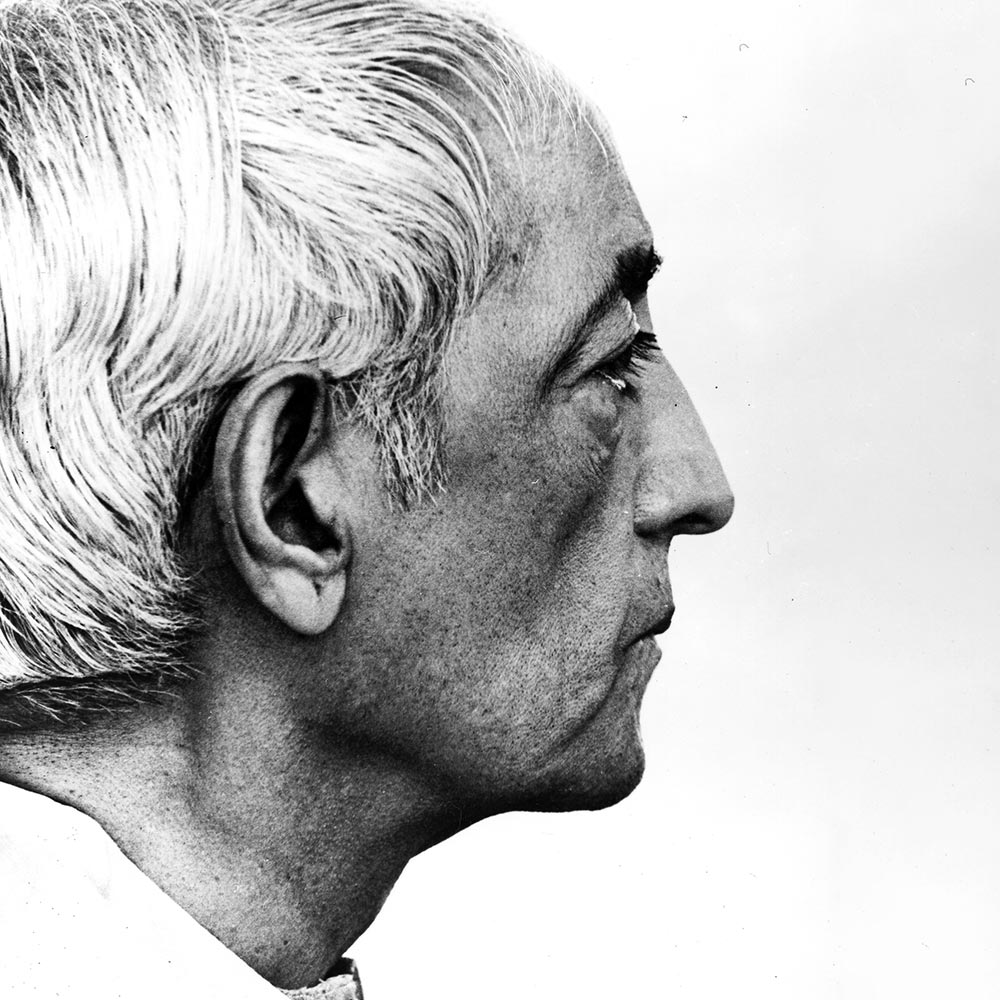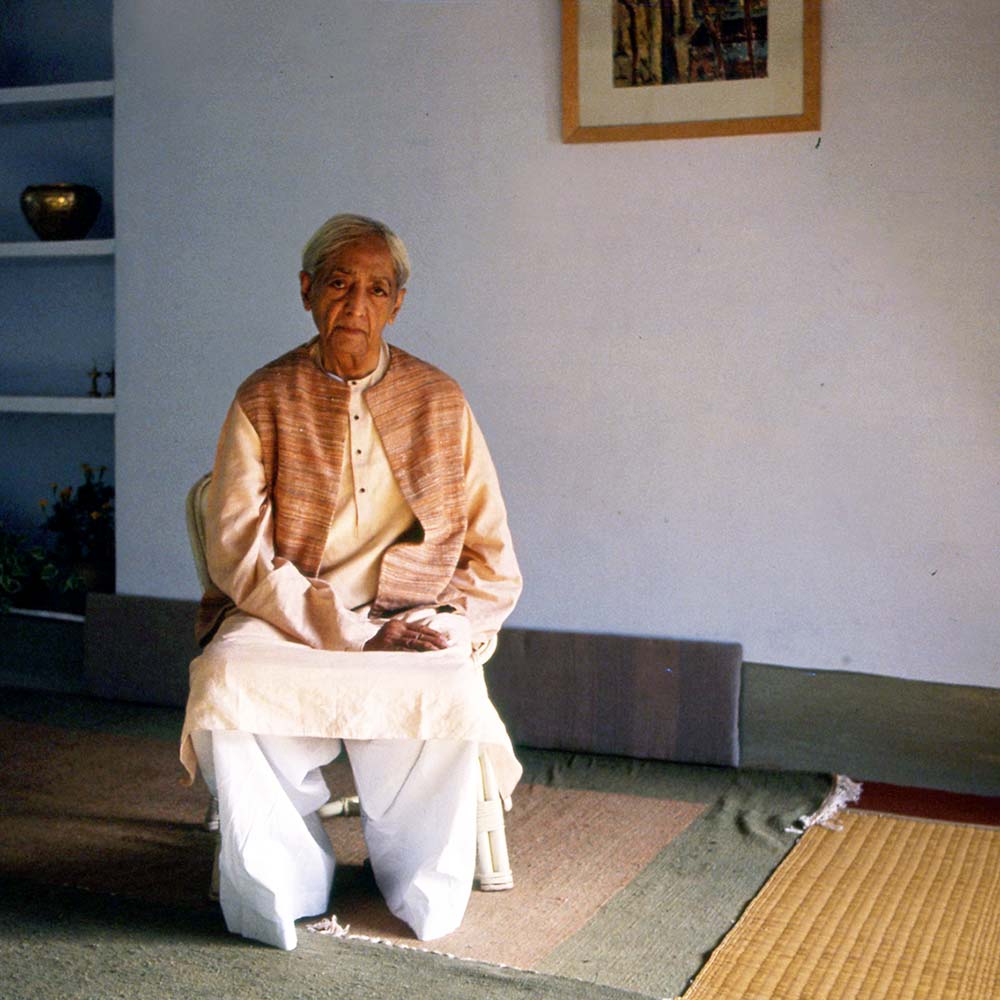
Curated by THE FOUNDATION STAFF
THE COMPUTER IS artificial intelligence; it can learn, correct itself, write, compose music, and so on. So the computer, the machine invented by man, is changing society. It is changing the structure of outward human existence. Whether you know about it or not is perhaps of very little importance, but it is taking place; it is happening. If the machine can do everything thought can do – invent gurus, rituals, gods, write poems, beat a grand master in chess – what then is man? This is an important question you have to ask. I don’t think many of us realise what a dangerous state we are in.
Krishnamurti in Bombay 1981, Talk 6
ARTIFICIAL INTELLIGENCE REPRESENTS an increasing challenge in our lives. Recently, it has become a major topic of conversation given the availability of AI to generate text, images and even video rapidly, and due to its wider implications on all aspects of our lives.
Krishnamurti began to use the term’ artificial intelligence’ in the early 1980s. As long ago as the 1950s, he spoke of the human brain being programmed like a computer and, before that, thought being mechanical. As the use of computers grew, Krishnamurti, as ever, reflected the phenomenon back to ourselves, asking vital questions. What is our place if computers and AI can do most of what we can do faster and more efficiently? What is the future of humanity? What is the nature and place of thought? Is there another kind of learning that isn’t programming? What is the nature of intelligence? In the face of this technological challenge, is it possible for that aspect of ourselves that can never be replicated or touched by technology to come to the fore?
This article highlights key aspects of what Krishnamurti said about AI, computers, robots, cybernetics, and the fundamental challenge they represent to humanity and each one of us.
GREAT CHANGES ARE taking place in the world, in the scientific field and the field of medicine. There is the computer, there is automation; these are going to give man a great deal of leisure. That leisure has probably not come yet, but it is coming. Man will have great freedom and leisure to do what he will. Science is probing into the question of prolonging life indefinitely, bringing about children through different methods, and so on. All this is taking place, and that is going to revolutionise the whole of society. The family and relationships are going to be revolutionised. A great change is going on in the world, economically, socially, scientifically and medically. What is going to happen to man – that is, to you and to me – in this tremendous revolution that is taking place?
Krishnamurti in Bombay 1966, Talk 3
OUTWARDLY THERE IS a tremendous revolution going on in cybernetics and automation. One must have asked oneself whether it is at all possible for one to change at all, not in relation to outward events, not a change that is a mere repetition or a modified continuity, but a radical revolution, a total mutation of the mind. When one realises, as one must have noticed within oneself, that actually one doesn’t change, one gets terribly depressed, or one escapes from oneself. So the inevitable question arises: can there be change at all? Is there change at all in human beings? Have you changed at all? Perhaps there has been a modification on the periphery, but deeply, radically, have you changed? Perhaps we do not want to change, because we are fairly comfortable. We have a government that looks after us, a welfare state, an assured job, pensions, and all the rest of it; so perhaps there is no motive to change. When there is a motive to change, it is change within the field of the known.
Krishnamurti in London 1965, Discussion 5
What Is the Difference Between the Human Brain and the Computer?
THE COMPUTER CAN do what a human being does: acquire experience, store up memory, respond, learn, and add more knowledge. It can play chess with an expert, a master. The first time, it is beaten, but it learns the moves and why it has been beaten. That learning is stored up as memory. The second time it plays, it learns more; the third or fourth time, it beats every chess master. That is how our brains work – learning, knowledge, fail, more knowledge, and gradually we become expert.
Now, what is the difference between the human brain and the computer? I am not an expert, but I have talked to experts in California, Europe and India. If you have studied it a little bit, you will see this is what the computer is doing: learning constantly, acquiring knowledge so that it can respond instantly. And that is what our brain is doing. So what is the difference between the human brain and the computer? There isn’t any. I wonder if you see this. If a machine can do it, and the human brain can do it too, there is not much difference. But the human brain has some other quality: to find out what intelligence is. If the computer can do what the human brain can do, then we are not intelligent. There must be a quality of intelligence which only we can find out.
Krishnamurti in Madras 1980, Talk 2

The Problem Facing Humanity
COMPUTERS CAN DO everything thought can do. The computer can learn, correct itself, and from that correction learn further. The computer can do what thought can do – it can say, ‘I believe in God,’ because it has been programmed that way, as we human beings have been programmed, as we human beings have been wired to say, ‘I am a Hindu,’ or Buddhist, or ‘I believe in God.’ The computer, being programmed like us, can say exactly what you are saying. I wonder if you realise the consequences of this.
Modern technology has taken over your brain. It is happening; this is not the invention of the speaker. Computer experts are very clear that all thought can do, the computer can do. And with the robot, the computer can do mechanical work in a factory, producing cars without the help of man. So what becomes of man? What becomes of you when what you think, what you feel, what you have – all that thought – the machine can do? Do you understand the seriousness of this? We have to meet a tremendous crisis. This is a problem facing mankind: the machine, invented by thought takes over all the activity of thought and leaves man with what? What has he then?
The computer is doing everything that thought can do.
It can be told how to meditate, and will tell you how to meditate – it becomes your guru! Please don’t laugh, this is much too serious. I don’t think you realise what is happening. It will give you a new mantra. It will take over all the activity of thought, and where is man then? If the computer and robot take the place of man, what is man then? Either he pursues pleasure, entertainment, football, television, sex, or all the circus that goes on in the name of religion, which is another form of entertainment, or he turns inward. You have that choice in front of you. It is coming; this is your challenge. If you pursue entertainment, invented by thought through computers, your life then becomes totally empty. Or you turn to the psychological, inward search.
So this is facing you as a human being. If you are concerned and therefore accept this challenge, you either turn inward or pursue pleasure and entertainment. You have lived on thought. Your activity is based on thought. Your thought has denied love. Your thought has made the computer. And you, as a human being, have been deprived of all the things thought has done. So you have to face this. If you are inclined to be entertained for the rest of your life, then what happens to your brain? It will either wither, slowly decay because the computer is doing everything that thought can do, or you turn and look at the psychological structure of yourself. That psychological structure is consciousness.
Krishnamurti in Bombay 1981, Talk 2
What Will Become of Human Beings?
HAVE YOU HEARD of genetic engineering? Scientists are trying to change your whole behaviour whether you like it or not; they are trying to change your way of thinking. That is genetic engineering. So when genetic engineering and the computer meet, as they are going to presently, what are you? What are you as human beings? Your brains are going to be altered; your way of behaviour is going to be changed. They may altogether remove your fear, your sorrow, remove all your gods. They are going to – don’t fool yourself. It all ends up either in war or in death. This is what is happening in the world actually: genetic engineering on one side and the computer on the other. When they meet, as they are inevitably going to, what are you as a human being?
Your brain now is actually a machine.
our brain now is actually a machine. You are born in India and you say, ‘I am an Indian.’ You are encased in that. Or you are born in Russia – same again. You are a machine. Please don’t feel insulted. I am not insulting you. You are a machine that repeats, repeats, or thinks it is different. Don’t imagine that there is something divine in you – which would be lovely – something holy, everlasting. The computer too will say that to you. So, what is becoming of human beings? What is becoming of you?
Krishnamurti in his last ever public talk, Madras 1986, Talk 3
ONE HAS TO inquire into this whole question of memory, memory accumulated as knowledge and experience, stored up through association and all the rest of it, as in the mechanical computer. In the mechanical computer, the electronic brain, man has built a series of memories in layers, banks of memories. When those are called upon, the computer begins to think. In us, memory becomes the ‘I’, from which there is thought – a reaction as thought. If you understand this, then there is only thinking, not control of thought. Then you see the whole mechanism of thinking.
Krishnamurti in Bombay 1964, Talk 6
A Quality of Spontaneity
IT SEEMS TO ME that the primary interest of any healthy mind has to be with facts as they are. A human being living in this world has not only to acquire food, clothes and shelter but also to resolve psychological conflicts, stresses, strains and fears. For this, the first thing that one has to do is to know oneself – not as an idea, but actually to understand the movement of thought which is not logical, which is capricious, vagrant, and usually without purpose. One has to understand the whole mechanism of thought, not logically but actually. Our logic, which is never spontaneous but is a reasoned, calculated process, can be only as a computer. That is what we are becoming. We are becoming rather poor imitations of the extraordinary machines called computers. If we merely look at ourselves logically, cultivate memory, which directs what we should and should not do, then such logical consecutive action will inevitably lead to mechanistic activity – that of the computer.
We are becoming imitations of computers.
I do not know if you are following all that is going on in the world. We human beings, whether we are religious, whether we are scientific, or whether we are extraordinarily clever, are becoming imitations of computers, our chief concern being the cultivation of memory: ‘I have done this, I must do that; I am not that, but I am going to make an effort to become that’. All this is based on logical memory, and logical memory leads to a life of the computer. I am not saying that you should be illogical; on the contrary, we should be aware of the process of a mind that merely functions on memory. There has to be a quality of spontaneity. That is, you have to discover yourself anew, see yourself as something that is changing all the time. If you can observe it, see it spontaneously, then the mechanistic process of memory has very little significance.
Krishnamurti in Benares 1963, Talk 2

Supreme Intelligence
KRISHNAMURTI: Are you clear – as clear as in the knowledge a cobra is poisonous – that thought can never under any circumstances reach intelligence? People are using thought to create a machine that can think, a super computer, artificial intelligence. They are working to create a brain which will be like ours, which will be mechanical. They are using their tremendous knowledge of the brain to produce an artificial brain which is based on thought.
Do you see this as a fact? To see it as a fact is to see that thought under no circumstances can have the other. If thought is no longer the instrument of inquiry, then you have nothing else with which to inquire. You can’t inquire. Then what is intelligence that is not based on inquiry?
Artificial intelligence is capable of destroying the world.
I want to inquire into truth. I don’t know anything about it. I don’t want to depend on anyone to find out. So I have to discard all of the past. I want to find out what supreme intelligence is. So, can I discard everything that I know? The only instrument I have is thought. I can think clearly because I have been trained to think not sentimentally but objectively. Thinking which can produce so-called intelligence is then on the same level as thinking that has produced war. Therefore, it is not intelligence. So under no circumstances will thinking have a perception of that. I must be absolutely clear. If I am not clear unconsciously, deeply, then thought is going to interfere.
Before anything else, I want to clear the board. Is that possible? I see that what they are doing won’t get them there. They will create mechanical, artificial intelligence which is like human intelligence. That is capable of destroying the world. Thinking, and all the instruments thought has invented to investigate into that – meditation, various types of silence, various types of self-denial – are out. The technologies won’t accept that, but true inquiry is that. And they haven’t found it. They are anchored to thought, and they move through thought. They won’t accept that thought can under no circumstances come to it. Then what have I left to see that thought, under any circumstances, cannot produce intelligence?
Krishnamurti in Madras 1980, Small Group Discussion 1
